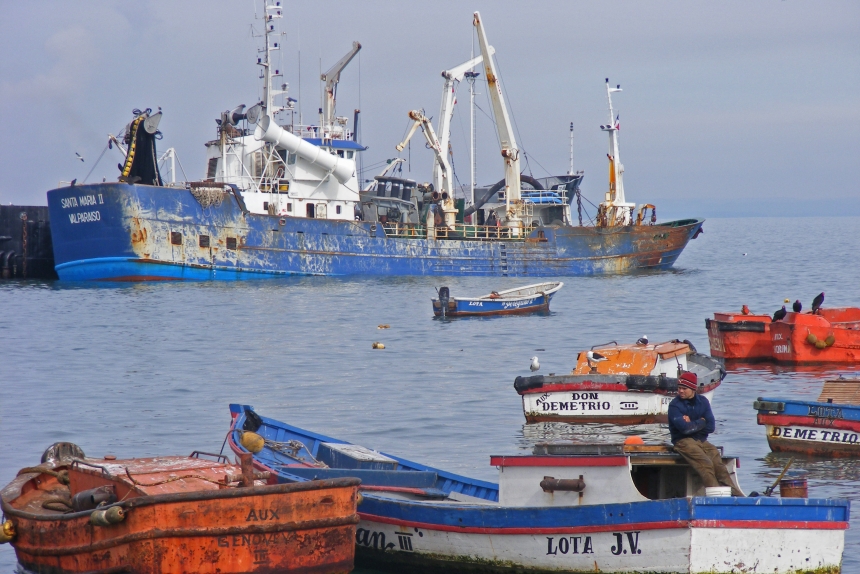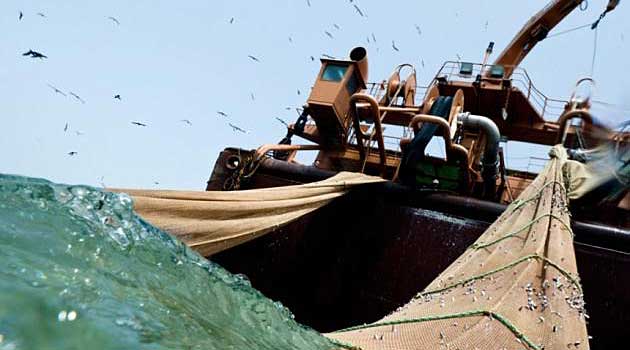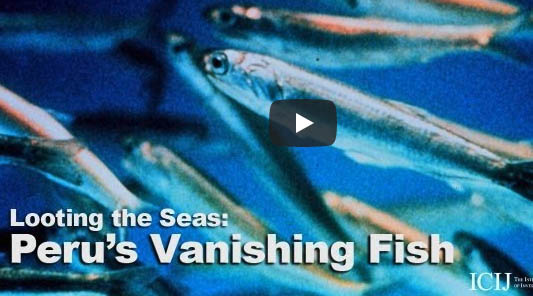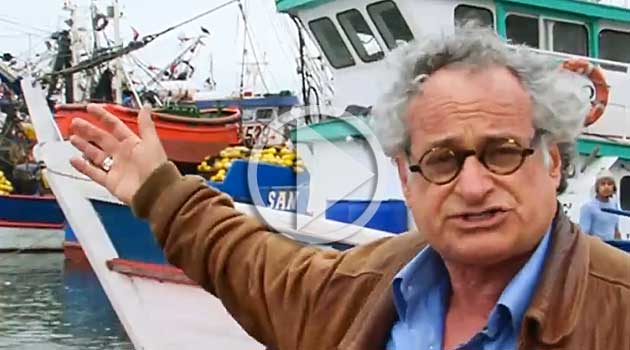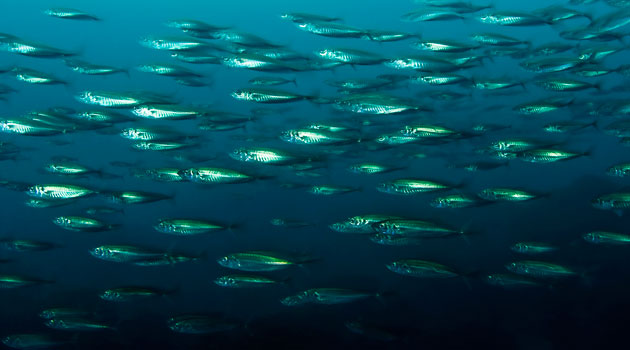ABOARD THE SANTA MARÍA II, Chile — It is 10:30 a.m. on an August Sunday, seven miles off Corral port, and crewmen on the Santa María II haul in the net after half an hour in the water. Captain Eduardo Marzán watches from the bridge, face grim. To his left, 14 other ships circle slowly as his has done for four days in fruitless search of sardines.
The government reported in 2010 that sardines were still plentiful in Chilean waters while jack mackerel headed a list of 13 species that were in danger. Today, even sardines are scarce.
The Santa María II belongs to Lota Protein, owned by the Koppernaes Group in Norway, which has waged a 21-month legal war with eight groups that own rights to 87 percent of jack mackerel in Chilean waters, as well as most sardines, anchoveta and hake. Lota Protein says an auction for quotas would give others a fairer share.
Powerful Chilean families dominate these groups. They are, in essence, Chile’s lords of the fish.
An analysis by the International Consortium of Investigative Journalists (ICIJ), with the Chilean investigative center CIPER, shows how over the last decade governments systematically enabled them to flout science and secure unrealistically high quotas. This contributed significantly to a precipitous collapse of jack mackerel in the South Pacific, once one of the world’s richest fishing grounds.
The Santa María II searches in vain. Finally, sonar signals a school, and crewmen drop the purse seine net four times. Barely 40 metric tons go into tanks that hold 850. Captain Marzán abandons his usual optimism. Authorities moved up the annual two-month ban to protect sardines, and it begins at midnight, in a few hours.
No more blips appear on the sonar, and Marzán orders his vessel home. I ask whether he might go back out for jack mackerel, and he heaves a sigh. Until a few years ago, he replies, he would have headed for La Feria, a small sector 30 miles off the coast where on good nights boats were so numerous that their lights looked like a floating city. Those days are gone.
By radio, several captains far out in open waters beyond Chile’s exclusive zone told Marzán that they spent 15 days fishing, and their holds are practically empty.
Mario Ulloa, who pilots the Santa María II, recalled the glory days: “We used to just pitch up and cast the net. We filled the hold in a single throw and returned to port with a full load of jack mackerel. We’d go out two or three times a day. There was plenty of fish, but we didn’t know to take care of the stocks.”
Lax Controls, Vanishing Stocks
Chile’s maximum catch limit law, one of its two fisheries codes, dates back to 2001. During the 1990s, Chileans caught more than 28 million metric tons of jack mackerel, and the government said it wanted better control. The law gave artisanal fishermen — there are more than 80,000 of them today — exclusive access to jack mackerel within five miles of the coast and five percent of the overall quota. Industrial ship owners got the rest.
Soon after, the big fish ate the small ones. Major companies bought up competitors. They contracted artisan fishermen to acquire their quotas. Together, they operate as an informal fisheries trust, an interlocking network in which some hold shares in others. And they band together to defend common interests.
The government does not charge for quotas. Companies pay only a small fee based on their vessels’ gross tonnage, about 2 percent of their export earnings, which earns Chile about $30 million a year. The government plans to add a royalty from 2013, recognizing fish, like mining, as an extractive resource. Industry is trying to block it.
Chileans caught 72 percent of jack mackerel landed in the southern Pacific from 2000 and 2010, but after 2005 competition grew intense. A score of nations formed the South Pacific Regional Fisheries Management Organization (SPRFMO), and the world’s biggest fishing vessels now trawl beyond Chilean waters.
The fish numbers are so low in Chile that fleets have not reached their full quotas since 2007. In 2010, the limit for jack mackerel was 1.3 million tons. Nets caught less than 465,000. Lota Protein has 1.4 percent of the jack mackerel quota. It did not catch enough in 2011 to reach even those levels.
Chile’s maximum-catch limit law was meant to last two years, but the lords of the fish lobbied hard, and it still remains in force. A new bill, expected to pass in 2012, mostly extends the status quo. It provides for bidding if jack mackerel is unusually abundant and allows more access to other species.
Chilean authorities propose quotas based on advice from Ifop, the government-funded fisheries institute. These then go to the national fisheries council, the CNP, made up of civil servants, union leaders, a lawyer, two engineers and two marine biologists. But 60 percent of CNP members are from industry, and the majority rules.
If the CNP rejects the proposal, the new quota is set automatically at 80 percent of the previous one. Yet the interplay can be complex. For 2009, as jack mackerel stocks plummeted, Ifop advised 750,000 metric tons. The government proposed 1,400,000 metric tons — nearly double — and CNP accepted it.
Eduardo Tarifeño at the University of Concepción, a marine biologist on the CNP, says he makes little impact. “Everything is discussed and already cooked before we get to the sessions,” he told ICIJ. “The industry talks with the fisheries secretary and asks him how much he is thinking of proposing. Then they tell him that they need more tons to keep the industry working.”
In 2010, the government took firm action after Ifop scientists who reported nearly six million tons in Chilean waters in 2001 found none at all in 2009. It pressed for a cut of 76 percent to 315,000 tons in 2011, and the CNP approved it.
But then this promising direction was reversed. On Dec. 20 of last year, with Tarifeño absent to teach a class, the CNP rejected a significant cut for 2012.
Although the new law is expected to alter the CNP’s role in 2013 and limit the influence of industry, Tarifeño argues that only a five-year ban on fishing jack mackerel can save the stock.
Power Plays and Privilege
As the crisis worsens, government officials and industry leaders trade accusations, each side blaming the other for the depletion of the fish.
Pablo Galilea, under-secretary for fisheries, blames the large companies — and earlier administrations that they lobbied — for catching far too much. He told the daily El Mercurio in December, “Fisheries were administered with a short-term vision, which provoked irreparable damage to the resource.”
Luis Felipe Moncada, president of Asipes, one of the two major industry associations, told ICIJ that authorities, not the CNP, were at fault. If the government wanted to protect the fish, he said, it should have imposed progressively lower quotas.
He said the government abused the controversial category known as “pesca de investigación,” research fishing, which allows companies to bypass minimum size limits. He singled out the north, where influential businessman Roberto Angelini controls three-quarters of the jack mackerel quota in an area crucial to reproduction.
Catches of undersized fish, or juveniles, in the north are putting the resource at grave risk, Moncada said.
Chile reserves up to 3 percent of its quota for research, with no limits on the size of the fish. Scientists use only a fraction of the catch; the rest goes to industry. But Chilean authorities confirmed to ICIJ that for years this exception has applied to all jack mackerel in the north. In 2011 alone, this would increase “research” fishing to 17 percent of the overall quota, about 48,000 metric tons.
In fact, a government report shows that the majority of the fish caught in the north since 1998 were juveniles.
A recent regulation, meanwhile, cut the legal size for jack mackerel in the north of Chile from 26 centimeters to 22 centimeters. Peru’s limit, in contrast, is 31 centimeters.
The Heir
Besides fishing interests, Roberto Angelini’s empire also includes Chile’s largest petroleum company, with 620 gas stations. He is president of Copec S.A., 60 percent family-owned, a conglomerate that extends to timber, cellulose, mines, electricity, retail stores and vehicle franchises.
Chileans call Angelini, 63, “The Heir.” He took over from his uncle, Anacleto, who emigrated from Italy in 1948 and married a Chilean. The year Anacleto died, 2007, Forbes magazine ranked him tied as the richest man in South America, worth an estimated $6 billion.
When Roberto was still a teenager, his parents sent him to live with his uncle. He went to Verbo Divino, the Roman Catholic academy favored by Chile’s elite; President Sebastian Piñera studied there. After graduating from Catholic University, he went his own way. Within two years, he joined the family business in one of its key sectors: fishing. In a matter of years, Anacleto tapped him as his successor.
Today Angelini’s two fishing companies, Orizon and Corpesca, control 29.3 percent of Chile’s overall jack mackerel quota. Together these companies supply 5.5 percent of the world’s fishmeal.
Intensely private, Angelini shuns interviews and cameras. He declined to comment for this story. A few photos show him silver-haired, sleek and well fed, mostly in a dark red tie. When Italy admitted him to its Order of Merit, he agreed to speak only to a few selected guests at the embassy in Santiago.
Rodrigo Sarquis is another pivotal figure. His fortune is only from fish. Sarquis’ grandfather began a small company in 1961. In recent years, his company bought several smaller fishing firms and in 2011 merged with a competitor to create Blumar S.A. It has the largest single share of jack mackerel: 18.6 percent. Sarquis is president of the major industry association, Sonapesca. Until December 2010, he was a fixture on the CNP, the influential national fisheries council.
Roberto Izquierdo Menéndez, 71, assumed Sarquis’ seat on the CNP. His family owns two fishing companies, Alimar and Sopesa, and he heads a conglomerate with interests in Chile’s largest telecommunications company, its most important financial newspaper, a large paper mill, a company that makes polypropylene and, since 2010, a thermoelectric center. He lost a bitter property dispute with the American businessman Douglas Tompkins, who established a vast nature reserve in southern Chile.
Jorge Fernández and brothers Jan and Klaus Stengel merged most of their fishing operations in 2011 after years of competing. Together they control 17.2 percent of the jack mackerel quota. Both families are also active in separate businesses, including salmon farms in southern Chile, which depend heavily on fishmeal made from jack mackerel.
Francisco Javier Errázuriz, 69, holds only a small quota but is a colorful member of the group. Known as “Fra-Fra,” he was a center-right candidate for president in 1989, later elected senator. While in Congress, he was fined and given a suspended sentence for kidnapping and aggression during a dispute over water.
Recently, Errázuriz was accused of human trafficking, charged with illegally importing at least 150 Paraguayans to work his fields. In October, just as the prosecutor was to formalize charges, Errázuriz had a stroke. He remains in the hospital. His company did not respond to ICIJ’s request for comment but his son, Francisco Javier, has publicly denied the human trafficking accusations against his father.
Sarquis, Fernández and Izquierdo Menéndez also did not respond to requests for comment.
‘The Sea Belongs to Businessmen’
On the Santa María II, Jaime Araneda talks about his fishing family, back to his grandfather. He has worked for 11 years in the big companies’ fleets. Now he fears the future.
When he started fishing, boats came back after three or four days, always full of jack mackerel. Today they go out to high seas well beyond Chilean waters for at least 12 days. Often, they come back nearly empty.
“The sea no longer belongs to Chileans,” Araneda says. “It belongs to the businessmen. If things continue like this, in one or two years more it won’t be worth fishing in Chile.”
